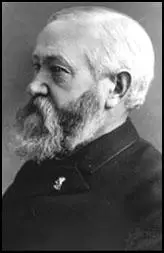Benjamin Harrison

Benjamin Harrison, the grandson of William Henry Harrison, was born in North Bend, Ohio, on 20th August, 1833. After graduating from Miami University he became a lawyer in Indianapolis. Harrison served as a Union Army officer during the Civil War (1861-65).
Harrison failed in his attempt in 1876 to become governor of Indiana. Elected to the Senate in 1881, he was selected as the Republican presidential candidate in 1888 and defeated the Democratic candidate, Grover Cleveland by 233 electoral votes to 168.
In 1890 Harrison managed to persuade Congress to pass the McKinley Tariff Act which raised duties on most imports. He was also responsible for the Sherman Anti-Trust Act that declared illegal any business combination that sought to restrain trade or commerce. The act was unable to achieve its original objectives. The two main reasons for this was the vague wording of the legislation and the absence of a strong independent commission for its enforcement.
Harrison's foreign policy concentrated on expanding US influence. This included negotiating a treaty with Great Britain to refer to arbitration a long-standing controversy over the hunting of seals in the Bering Sea in 1892.
Harrison was the Republican presidential candidate in 1892 but was defeated by his old rival, Grover Cleveland. Benjamin Harrison died in Indianapolis on 13th March, 1901.
Primary Sources
(1) Robert La Follette, Autobiography (1911)
Benjamin Harrison was a man of superior ability. Reserved, undemonstrative, a bit austere in manner, direct, quick to grasp a proposition and decide on its merits, Harrison was a strong executive, commanding the respect and confidence of all whom he came in contact. He was conservative but not what we would call to-day reactionary.
